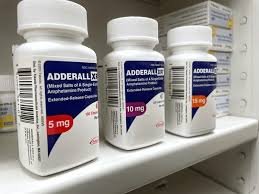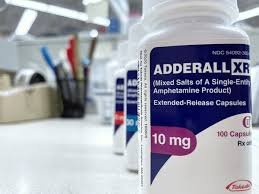Table of Contents
How long does Adderall stay in your system?

Adderall is a prescription drug commonly used to treat attention deficit hyperactivity disorder (ADHD) and narcolepsy. It contains a combination of amphetamine and dextroamphetamine, two central nervous system stimulants that help improve focus and control impulses. Understanding how long Adderall stays in your system is important to managing your medication, especially when preparing for a drug test or evaluating the drug’s effects on your body.
1. Overview of Adderall’s Mechanism
Adderall works by increasing levels of neurotransmitters in the brain, specifically dopamine and norepinephrine. These chemicals play an important role in controlling focus, attention and impulse. The drug is available in two basic formulations:
- Immediate Release (IR): This form of Adderall is rapidly absorbed into the bloodstream, with effects starting within 30 to 60 minutes and usually lasting about 4 to 6 hours. live
- Extended Release (XR): This version releases the drug slowly over time, providing a longer duration of effect, usually between 8 and 12 hours.
2. Adderall detection time
The length of time Adderall stays in your system can vary based on several factors, including the type of test used, dose, and individual metabolism. Below is a detailed overview of how long Adderall can be detected by various testing methods.
a) Blood tests
- Detection Window: Ingestion can usually be detected in the blood for 24 hours after ingestion. Blood tests are sensitive and can detect the drug immediately after use.
- Factors Affecting Detection: The window of detection in blood is shorter than other methods due to the rapid metabolism and clearance of the drug from the blood stream.
b) Urine Test
- Detection Window: Adderall can be detected in urine for approximately 2 to 4 days for occasional users. For those who use the drug more frequently or in higher doses, detection may extend up to 7 days.
- Factors Affecting Detection: Urine tests are most commonly used for drug testing because amphetamines, including Adderall, are excreted in the urine. Detection duration may be affected by hydration level, frequency of use, and overall metabolic rate.
c) Salivary tests
- Detection Window: Adderall can be detected in saliva for approximately 1 to 2 days. Saliva tests are less invasive and can provide immediate results, but have a shorter detection period than urine tests.
- Factors Affecting Detection: Saliva tests detect the presence of Adderall in the mouth and throat, which may be cleared faster than urine or blood.
d) Hair Follicle Test
- Detection Window: Hair follicle tests can detect Adderall up to 90 days or longer after use. This method provides a long-term perspective on drug use, as the substances are incorporated into the hair as it grows.
- Factors Affecting Perspiration: Hair tests are less commonly used but are the most reliable for detecting long-term use. Hair growth rate, hair sample length, and individual metabolism can affect the detection window.

3. Factors Affecting the Duration of Adderall in the Body
Several factors can affect how long Adderall remains detectable in your system:
a) Dosage and frequency of use
- High Doses: Taking high doses of Adderall can extend the detection window because the drug stays in the body for a long time before being metabolized and excreted.
- CHRONIC USE: Regular or high frequency use may lead to accumulation of the drug in the system, possibly prolonging the detection period.
b) Metabolism
- Individual Metabolism: People with fast metabolisms usually process and eliminate drugs more quickly. Factors such as age, genetics and overall health contribute to metabolic rate.
- Body weight: Individuals with excess body weight may experience slower metabolism of Adderall, which may prolong the presence of the drug in the system.
c) Kidney and liver function
- Liver Function: Adderall is metabolized in the liver. Liver impairment can slow down the breakdown of the drug by increasing its availability in the body.
- Kidney Function: The kidneys play a role in the excretion of Adderall from the body. Decreased kidney function can affect how quickly the drug is excreted in the urine.
d) Hydration and diet
- Hydration: Staying well hydrated can help facilitate the excretion of Adderall through the urine. Increasing fluid intake can support the body’s natural detoxification process.
- Diet: A balanced diet that supports liver and kidney health can also contribute to efficient metabolism and elimination of Adderall.
4. Adderall and drug testing
Adderall is a stimulant and can be detected in various drug tests. Here’s what you need to know:
a) Workplace and pre-employment drug tests
- Drug Screening: Many employers conduct drug tests that check for amphetamines. If you have been prescribed Adderall, it is important to disclose this information to the testing agency or your employer to avoid any misunderstandings.
- Prescription Documentation: Providing documentation of your prescription can help clarify the presence of Adderall in your system and distinguish it from illicit drug use.
b) Drug testing for medical or legal reasons
- Medical Testing: If you are being drug tested for medical reasons, such as a routine health checkup or medical study, tell your healthcare provider about your Adderall use. Must be notified.
- Legal Check: In legal situations, such as probation or court-ordered drug tests, be sure to provide proof of your prescription to avoid legal complications.
5. Tips for managing Adderall withdrawal
If you’re concerned about how long Adderall stays in your system, especially before a drug test, consider the following tips:
a) Follow recommended dosage
- FOLLOW THE DOSAGE: Take Adderall only as prescribed by your healthcare provider to reduce the risk of detection problems and side effects.
b) Communicate with health care providers
- Notify Providers: Always notify your doctor and any testing agency of your Adderall use to ensure accurate interpretation of drug test results.
c) Avoid off-label use
- NO ABUSE: Avoid using Adderall without a prescription or in higher doses than prescribed. Improper use can lead to serious health risks and complications.
6. Disclaimer and discontinuation
If you need to stop taking Adderall, especially if you’ve been using it regularly, be aware of possible withdrawal symptoms and consider the following:
a) Withdrawal symptoms
- Fatigue: Feeling excessively tired or sleepy.
- Depression: experiencing low mood or depressive symptoms.
- Irritability: Being easily agitated or irritable.
- Sleep problems: Difficulty sleeping or excessive sleep.
- Increased Appetite: Significant increase in appetite and possible weight gain.
b) Gradual tapering
- Tapering Off: It is advisable to taper off Adderall gradually under medical supervision rather than stopping suddenly to minimize withdrawal symptoms.
Adderall misuse: Risks and Consequences
Adderall is a prescription drug used to treat attention deficit hyperactivity disorder (ADHD) and narcolepsy. However, misuse of Adderall, including over-the-counter or non-prescribed use, carries significant risks and consequences. This guide provides an overview of Adderall abuse, its potential risks, and the importance of using the medication responsibly.
1. What is Adderall misuse?
- Adderall misuse refers to any use of the drug that deviates from its prescribed purpose. This includes:
- Using Adderall without a prescription: Taking Adderall without a doctor’s permission.
- Overdose: Using more Adderall than the dose recommended by a health care provider.
- Using Adderall to enhance performance: Taking the drug to improve academic or work performance without a medical need.
- Recreational Adderall abuse: Using Adderall for its stimulant effects to experience a “high” or increase energy.
2. Why is Adderall misuse dangerous?
a) Health Hazards
- Heart Problems: Adderall abuse can lead to increased heart rate, high blood pressure, and risk of heart attack or stroke.
- Mental Health Effects: Abuse can increase anxiety, lead to paranoia, and increase the risk of mood disorders.
- Addiction and Dependence: High doses or prolonged abuse can lead to physical and psychological dependence, making it difficult to stop using the drug.
- Sleep Problems: Abuse often causes insomnia or sleep disorders, which lead to further health complications.
b) Legal Consequences
- Illegal Status: Using Adderall without a prescription is illegal and may result in criminal charges, fines or imprisonment.
- Academic and Employment Consequences: Misuse of Adderall in academic or professional settings may lead to disciplinary actions, including expulsion from educational institutions or termination of employment.
c) Effects on personal life
- Relationships: Abuse can strain relationships with family and friends due to behavioral changes and possible cheating.
- Daily Functioning: Adderall dependence can interfere with daily responsibilities and personal well-being, affecting overall quality of life.
3. Signs of Adderall Abuse
Recognizing the signs of Adderall abuse can help to address the problem early. Common symptoms include:
- Overdose: Taking more Adderall than prescribed or using it more often.
- Behavior Changes: exhibiting erratic behavior, mood swings, or increased agitation.
- Physical Symptoms: Experiencing unexplained weight loss, insomnia, or cardiovascular symptoms.
- Compromised functioning: Difficulty maintaining work, academic performance, or daily responsibilities due to misuse.
4. How to Stop Adderall misuse
a) Follow the prescribed instructions
- FOLLOW DOSAGE: Take Adderall exactly as prescribed by your healthcare provider. Do not change your dose or frequency without medical guidance.
- Regular Checkups: Attend follow-up appointments to monitor medication effectiveness and side effects.
b) Keep your medication safe
- Proper Storage: Store Adderall in a safe place out of reach of others to prevent misuse or accidental ingestion.
- Avoid Sharing: Never share your medication with others, even if they have the same symptoms.
c) Educate yourself and others
- Understand the Risks: Be aware of the potential risks and consequences of abusing Adderall.
- Seek Help: If you or someone you know is struggling with abuse, seek help from a health care provider or counselor.
Additionally, misuse can lead to serious health risks and legal consequences. It is important that medications are used responsibly and only as prescribed by a healthcare provider. Understanding the risks of abuse, recognizing the symptoms and taking precautions can help ensure safe and effective use of Adderall.
If you or someone you know is struggling with Adderall abuse, seek professional help to address the issue and find appropriate support and treatment options.
Adderall FAQ
1. What is Adderall?
Adderall is a prescription drug that combines two stimulants: amphetamine and dextroamphetamine. It is commonly prescribed for the treatment of Attention Deficit Hyperactivity Disorder (ADHD) and Narcolepsy. Adderall works by increasing the levels of certain neurotransmitters in the brain, helping to control focus, attention, and impulse.
2. How does Adderall work?
Adderall increases the activity of neurotransmitters such as dopamine and norepinephrine in the brain. These chemicals are important for controlling attention, focus and impulse. By increasing their levels, Adderall helps manage the symptoms of ADHD and narcolepsy.
3. How long does Adderall stay in your system?
The length of time Adderall stays in your system depends on a variety of factors, including the type of drug test used, dosage, frequency of use, and individual metabolism. In general:
- Blood tests: up to 24 hours.
- Urine tests: 2 to 4 days for occasional users; Up to 7 days for heavy users.
- Saliva Tests: 1 to 2 days.
- Hair follicle tests: 90 days or more.
4. What factors affect how long Adderall stays in your system?
Several factors can affect the detection time of Adderall, including:
- DOSE AND FREQUENCY OF USE: High doses and regular use may prolong detection.
- Metabolism: Faster metabolism can lead to faster clearance.
- Body Mass: High body weight can affect drug metabolism.
- Kidney and liver function: Impaired function can slow drug elimination.
- Hydration and Diet: Adequate hydration and a balanced diet can support a faster metabolism.
5. Can Adderall show up on a drug test?
Yes, Adderall can show up on a drug test. It is classified as an amphetamine, which is commonly tested for in workplace and pre-employment drug tests. If you have been prescribed Adderall, it is important to notify the testing agency or your employer to avoid misunderstandings.
6. How can I manage to detect Adderall in drug tests?
To administer Adderall over the counter:
- Follow Prescribed Dosage: Take Adderall only as directed by your healthcare provider.
- Communicate with health care providers: Inform all relevant parties about your supplement use.
- Provide Documentation: Provide prescription documentation if required by drug testing agencies.
7. What are the common side effects of Adderall?
Common side effects of Adderall include:
- Increased heart rate
- Insomnia
- Dry mouth
- Loss of appetite
- Restlessness
- Weight loss
8. What should I do if I experience withdrawal symptoms?
If you experience withdrawal symptoms such as fatigue, depression, irritability, or sleep disturbances, it is important to consult your healthcare provider. They can guide you through a gradual tapering process to minimize the effects of withdrawal and address any concerns.
9. Can Adderall be used for conditions other than ADHD?
Although Adderall is primarily prescribed for ADHD and narcolepsy, it is sometimes used off-label for other conditions, such as treatment-resistant depression. However, any off-label use should be monitored by a healthcare provider.
10. Is Adderall addictive?
Adderall has the potential for abuse and addiction, especially when used in high doses or without a prescription. It is classified as a Schedule II controlled substance due to its potential for abuse. Always use Adderall as prescribed and under medical supervision to reduce the risk of addiction.
11. What should I do if I miss a dose of Adderall?
If you miss a dose of Adderall, take it as soon as you remember unless it is almost time for your next dose. Do not double the dose to make up for a missed dose. Consult your healthcare provider for specific instructions based on your feeding schedule.
12. Can Adderall interact with other medications?
Adderall can interact with various medications, including antidepressants, blood pressure medications, and other stimulants. It is important to inform your healthcare provider about all medications and supplements you are taking to avoid possible interactions.
13. How should Adderall be stored?
Adderall should be stored at room temperature away from moisture and heat. Keep medicines in a safe place out of the reach of children and pets.
14. What should I do if I have concerns about my Adderall prescription?
If you have concerns about your Adderall prescription, such as side effects, effectiveness, or potential interactions, consult your healthcare provider. They can provide guidance and adjust your treatment plan if necessary.
Conclusion
Adderall can stay in your system for varying lengths of time depending on the type of drug test, dosage, frequency of use, and individual factors such as metabolism and organ function. Blood tests usually detect Adderall for 24 hours, while urine tests can detect it for 2 to 7 days. Hair follicle tests provide the longest detection window, up to 90 days.
If you have been prescribed Adderall, it is important that you manage your medication responsibly and communicate openly with health care providers and testing agencies. Understanding how long Adderall stays in your system can help you make informed decisions and avoid complications related to drug testing.


Your article helped me a lot, is there any more related content? Thanks!
Your point of view caught my eye and was very interesting. Thanks. I have a question for you.